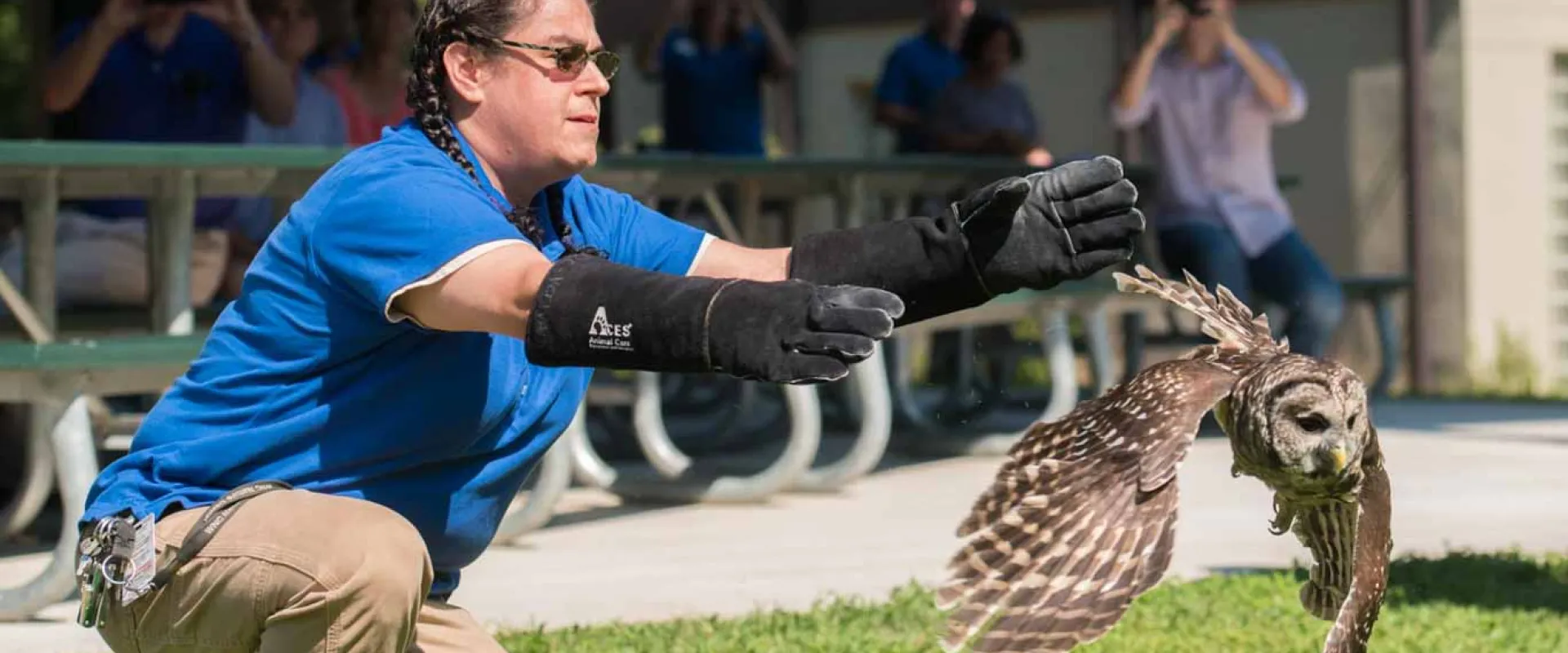Wildlife Rehabilitation Center
The North Carolina Zoo's Valerie H. Schindler Wildlife Rehabilitation Center provides free, professional veterinary and rehabilitation services to sick, injured and/or orphaned native North Carolina animals for the sole purpose of returning them to the wild in a condition that will optimize their chances of survival after release. The Wildlife Rehabilitation Center (WRC), while on Zoo grounds, is a gated medical facility and not open to Zoo Visitors. For assistance or more information, please call 336.879.7644.
Hours
WRC operating hours are dependent of staffing, please call the center to ensure that someone is available to assist you before transporting animals:
April - September 9 a.m. - 7 p.m.
October - March 9 a.m. - 5 p.m.
Contact Information
4401 Zoo Parkway
Asheboro, NC 27205
If you need immediate assistance, please call 336.879.7644.
For other questions, e-mail nczoo.wildliferehab@nczoo.org
Animal Rescue Advice
When an animal is injured, in danger, cold, dehydrated, or becoming weak, something needs to be done. An animal needs to be in the care of an experienced rehabilitator or veterinarian. Before handling or transporting wildlife, please contact us at 336.879.7644 so a trained volunteer wildlife rehabilitator can advise you on how to proceed.
The Wildlife Rehabilitation Center relies on the public to transport wildlife in need to the center. If you have been advised that the animal you have called about needs to be rescued, the information below may be of help.
Protect Yourself First
Even very young animals will bite if startled or hurt. A pair of heavy-duty gardening gloves should be adequate for most wildlife. Place a towel or sheet over the animal and scoop them up into a secure and well-ventilated container with a lid. Do not offer any food or water. Contact us at 336.879.7644 to arrange to have the animal admitted.
Baby Animals
Not all baby animals found alone have been orphaned and/or abandoned. Before rescuing a young animal, contact us at 336.879.7644 for advice.
If you have been advised to rescue an infant animal, place it in a secure, well-ventilated box with a heating pad on "low", but be careful not to allow the animal to overheat. Do not attempt to feed baby animals, this could significantly worsen their already delicate condition.
Find Help
Wild animal babies have special nutritional needs. To give them the best chance of survival, let an experienced, licensed rehabilitator raise them. It is against the law to keep wildlife without the proper permits. If you can't get the animal to the rehabilitator quickly, ask him/her what you should do. Doing the wrong thing can make matters worse or even cause the death of the animal. In the excitement of finding and holding a wild animal, injuries might be overlooked. If not given proper care, the animal may not live.
Wildlife and Rabies
Due to the potential transmission of disease, the Wildlife Rehab Center is not allowed to accept fox, raccoon, skunk or coyote. Also, this facility is not permitted to accept deer. Please see the North Carolina Wildlife Resources Commission website for additional information on orphaned or injured animals.
Staff
The Wildlife Rehabilitation Center is staffed primarily by trained Zoo volunteers, interns, and limited Zoo personnel. Volunteers and interns are relied upon for the care and husbandry of sick, injured and orphaned native wildlife, until they are ready for release back into the wild, as well as caring for our education animals. Duties include but are not limited to feeding animals, preparation of diets, cleaning enclosures, admitting patients, answering phones, and record keeping. Opportunities to assist the veterinary staff with medical tasks such as administering medications, physical therapy, assisting with radiographs and surgeries, as well as perform treatments as ordered by Veterinary staff may be available. In addition, there are opportunities for participation in special projects, training, enclosure building and animal rescues, as well as in our education animal programming.
Donate
The Valerie H. Schindler Wildlife Rehabilitation Center provides free veterinary and rehabilitation services to sick, orphaned and injured native North Carolina animals. Donations help buy medicines, food, shelter and veterinary services for the 800 or more injured, sick and orphaned native animals that arrive at the Center every year. Donate
